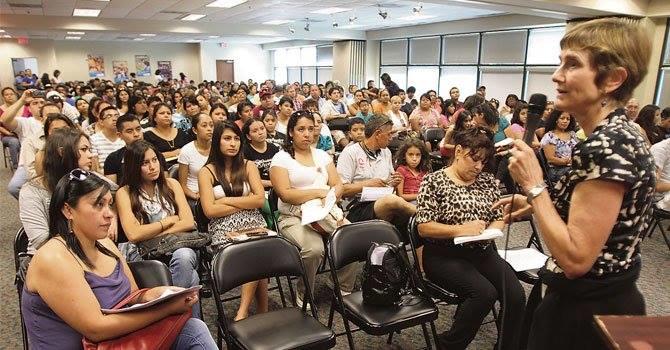
Section Branding
Header Content
Immigration In Atlanta: Smoothing The Transition
Primary Content

In the early 20th century, millions of immigrants streamed through Ellis Island. And you could say Hartsfield-Jackson International Airport is playing a similar role in the early 21st century. Atlanta has become a gateway for thousands upon thousands of immigrants into the Southeast and beyond.
In May, Mayor Kasim Reed appointed a working group tasked with smoothing the transition of those immigrants into society. Adam Ragusea, host of GPB Macon’s Morning Edition, spoke with the group’s co-chair Jeffrey Tapia, who is also head of the Latin American Association in Atlanta. She says their recommendations are taking shape. Here's the edited transcript below.
JEFFREY TAPIA, Executive Director, the Latin American Association: This is a group of immigrants and members from what we call the “receiving society” working together really to improve the quality of life of our immigrant and refugee population, particularly in four areas. We are really hoping to improve access to city services, educational opportunities. We want to increase entrepreneurial opportunities and economic empowerment. Have people ready for jobs. We’re going to increase civic engagement of our immigrant and refugee population. And we want to have great access to public safety. My other personal hope is that Mayor Reed and the work that we’re doing in the city of Atlanta will really set the tone for the rest of the region.
ADAM RAGUSEA, Morning Edition host, GPB Macon: Are there any challenges to integrating immigrants into the “receiving society” as you put it that are particular to Atlanta? That we don’t see elsewhere, not in the same way.
JEFFREY TAPIA: I think one of the things that’s interesting about Atlanta is that it is one of what we’re calling the most recent gateway cities. Atlanta has immigrants who have come in the past 10,15, 20 years. That’s a pretty recent arrival. The bulk of them have come in the past two decades. In this case, I’m referring to a Latino population. So immigrant populations typically have challenges because of the language. And because of their understanding of how social systems work in the new community… navigating in the new community. And those two challenges can lead to isolation, which is a challenge unto itself and can create some very difficult outcomes for families.
ADAM RAGUSEA: I wonder sometimes if technology is changing the way immigrants integrate into their new societies. Everybody can Skype back home if they want to. Everybody can send a remittance back home if they want to, very easily. Does that maybe discourage people from really assimilating into their new society?
JEFFREY TAPIA: No, I think it’s actually the contrary. The Latino community is completely connected through smartphones. And there is tremendous access to resources and to each other and to community through iPhones. And actually families can’t necessarily Skype back home with their family members because that requires the family member in the home country to have a computer and access to the internet. And that isn’t necessarily true for all refugees and immigrants.
ADAM RAGUSEA: Could you give me just one concrete example of some recommendation that you think your working group might present to Mayor Reed in the end.
JEFFREY TAPIA: I think that it would be safe to say that one of our recommendations and hopes is that this will be an ongoing effort. It’s not going to be a one-time initiative. It’s going to be an ongoing initiative.
ADAM RAGUSEA: Jeffery Tapia is the co-chair of the Welcoming Atlanta Working Group, created by Atlanta Mayor Kasim Reed. She’s also the executive director of the Latin American Association.Jeffery Tapia, thanks for talking to us.
JEFFREY TAPIA: Thank you.
Tags: Atlanta, immigration, Kasim Reed, Latin American Association, Jeffrey Tapia
